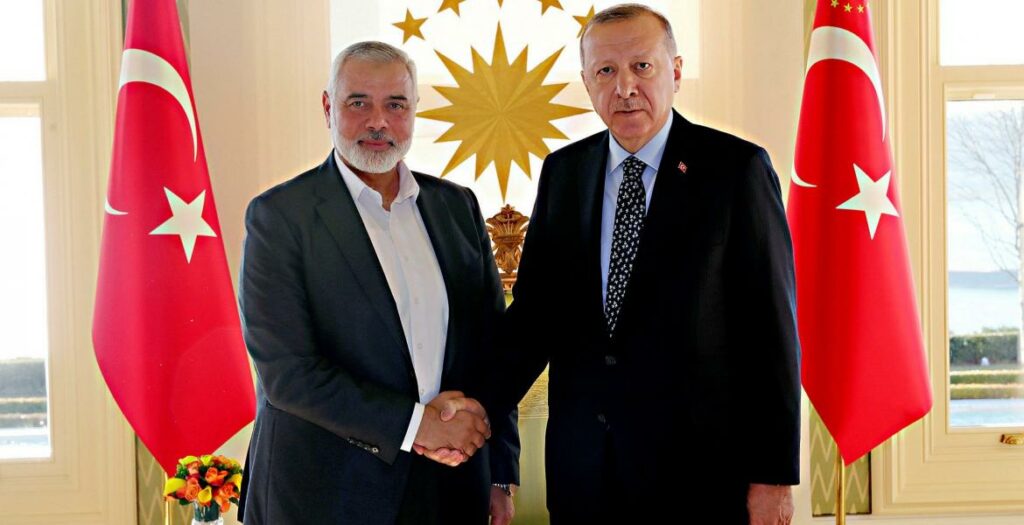Türkmen Terzi
The attack on Israel by the militant Islamist group Hamas on Oct. 7. shocked the world as armed Hamas members killed more than 1,400 people including civilians and soldiers.
Following the attack, Israeli Prime Minister Benjamin Netanyahu formed a war cabinet, while the country’s air force continuously bombed the Gaza Strip — the territory ruled by Hamas.
While the US and major European states support Israel’s military operations and Arab foreign ministers call for international action to end the war on Gaza, Turkish President Recep Tayyip Erdoğan has offered to mediate between Israel and Hamas.
At the same time, he has not shied away from criticizing Israel, saying the bombing of Gaza amounts to a massacre.
While some in the West accuse Iran of helping Hamas in the Oct. 7 operation, one should not lose sight of the fact that Erdoğan hosts Hamas leaders, and in order to share in Hamas’s popularity in the Muslim world, he will continue to provide them with a safe haven in Turkey
The Israel-Hamas conflict could soon spread to Lebanon and Iran. US President Joe Biden’s hopes for establishing Saudi-Israeli relations are no longer realistic in the short term.
Erdoğan is not happy with the Abraham Accords — the agreements on Arab-Israeli normalization that were signed by Israel and the United Arab Emirates and Bahrain on Sept. 15.
Erdoğan maintains close ties with Hamas and has restored relations with Israel after a long diplomatic crisis following the infamous Mavi Marmara incident. The Mavi Marmara was the flagship of a flotilla carrying humanitarian aid to Gaza that attempted to break Israel’s blockade of the Palestinian enclave in 2010, but Israeli commandos killed nine Turkish nationals on board and did not allow them to continue.
Erdoğan met with Palestinian President Mahmoud Abbas along with Hamas leader Ismail Haniyeh in Istanbul this July, and in September he met Netanyahu in New York. Netanyahu is not happy that Erdoğan maintains close ties with Hamas, but he obviously prefers Turkish to Iranian influence over Hamas.
Turkey has long argued that it is playing a moderating role toward Hamas, but the Oct. 7 attack shows that Hamas’s modus operandi is no less violent than that of Islamic State in Iraq and the Levant militants. Israel will not welcome Erdoğan’s call for mediation and will prefer Cairo’s involvement to that of Erdoğan and his ruling Islamist Justice and Development Party (AKP), which is very pro-Hamas.
Erdoğan is considered a staunch supporter of the Palestinian cause and has been popular among Muslim nations since he stormed out of a debate at the World Economic Forum in 2009 after an angry exchange with Israel’s then-president Shimon Peres.
Erdoğan and members of his ruling AKP continue to pledge support for Palestine and did not welcome the Abraham Accords, saying Israel’s normalization of relations with Arab nations will hurt the Palestinian cause.
In addition Turkey was concerned about Israel’s economic, political and military cooperation with the United Arab Emirates, a country that competes economically with Turkey in the region.
The normalization agreement would give the UAE an opportunity to gain a foothold in the Mediterranean.
At the time, Erdoğan threatened to sever diplomatic relations with the UAE over the Gulf state’s agreement with Israel, with the Turkish Foreign Ministry calling the deal “hypocritical behavior.”
In 2020, just days after the UAE-Israel agreement, Erdoğan and his intelligence chief received Hamas leader Ismail Haniyeh and his deputy Saleh al-Arouri, who is classified by the US Treasury as a Specially Designated Global Terrorist, in İstanbul.
Israeli diplomats for their part criticized Turkey for granting citizenship to 12 senior Hamas leaders, and British newspaper The Telegraph reported that Turkey grants citizenship to Hamas operatives who will have greater freedom in İstanbul to plot attacks on Israeli citizens around the world.
Additionally, Israel’s support for Kurdish independence in the 2017 Iraqi Kurdistan referendum and Israel’s growing economic cooperation with the Mediterranean countries of Cyprus, Greece and Egypt over eastern Mediterranean gas reserves angers the Ankara government.
Ankara was also strongly opposed to then-US president Donald Trump’s decision to relocate the US embassy from Tel Aviv to Jerusalem. The move resulted in a high death toll in Gaza after massive protests, and Turkey recalled its ambassadors to the US and Israel in May 2018, in an official protest of the Trump administration’s decision and Israel’s killing of dozens of Palestinians. It also expelled the Israeli ambassador to Turkey that same month. After four years, Turkey reappointed its ambassador to Israel in November of last year, while Israel named a new envoy to Ankara the following month.
Despite all the political and security crises with Israel, Erdoğan’s AKP has continued strong business ties with the country.
Israeli Defense Minister Benny Gantz visited Turkey last October, when the two countries signed several defense agreements.
In contrast, Turkey’s first domestic military consultancy firm, SADAT Inc. International Defense Consultancy, is providing arms to Hamas.
SADAT’s founder, Adnan Tanrıverdi, a former general, was dismissed from the Turkish military due to his extremist Islamist leanings in the 1990s. He has served as Erdoğan’s senior security adviser in the past.
According to reports, SADAT has been involved in the war in Libya, the Nagorno-Karabakh conflict and the Syrian civil war as well as assisting Hamas. In 2018 Israeli intelligence Shin Bet accused SADAT of arming Hamas.
Erdoğan is currently hosting members of the Hamas leadership in Turkey, and Erdoğan’s Islamist AKP will even strengthen its ties with Hamas as Netanyahu threatens that the Middle East map will change following Hamas’s deadly attack inside Israel. Turkey currently controls a large part of northern Syria and fears that the conflict in the region will spread inside Turkey from its Syrian border. The AKP and Hamas both subscribe to the Muslim Brotherhood ideology, and Erdoğan will try to increase its popularity in Muslim countries by hosting the Hamas leadership.

